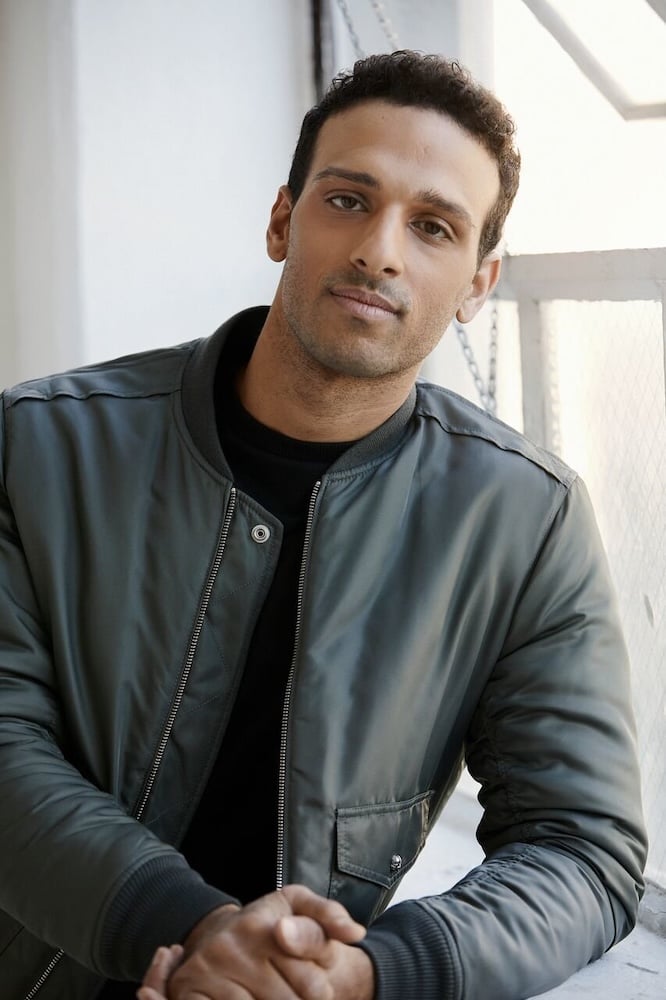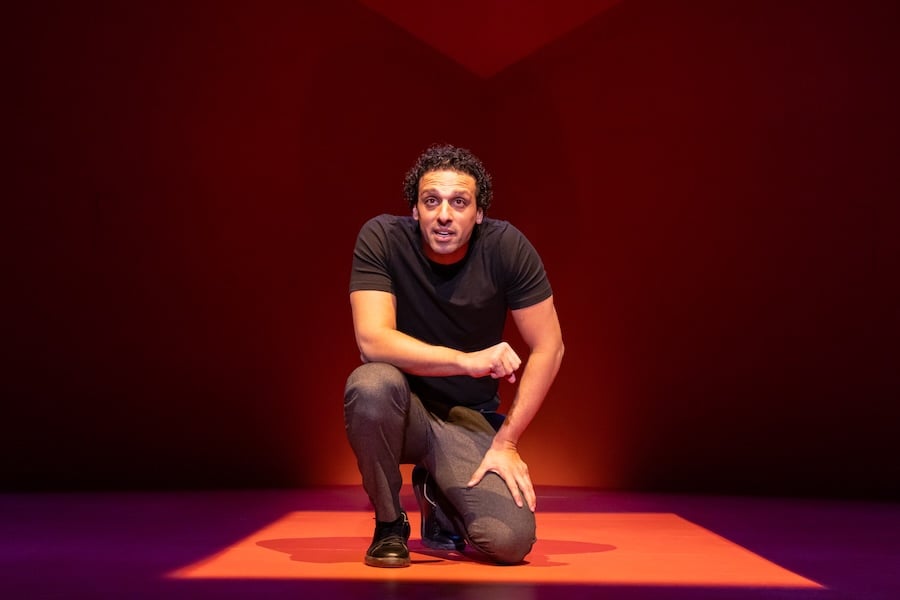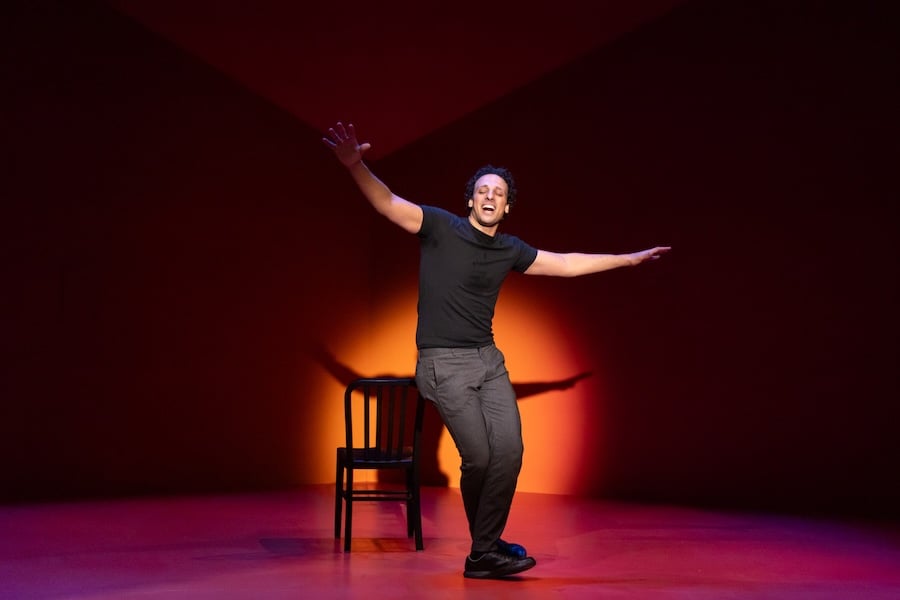Is he Arab? Israeli? American? Jewish?
Is he a product of the Middle East? A native Californian?
An actor with 10 years of credits? Author of an autobiographical play?
The answer is all of the above.
Ari’el Stachel is a Tony Award-winning actor who happens to be American-born, of Arab descent, and profoundly Jewish. He is also the star of his own autobiographical play, Out of Character — a funny and poignant account of his struggles with anxiety and his subsequent attempt to adopt different roles — now in its East Coast debut at Theater J. The solo performance, originally staged by the Berkeley Repertory Theatre in 2023, is a joint production of Mosaic Theater and the J.

I talked to Stachel — or Ari, as he prefers to be called — during a lull in rehearsals last month. “Two Jews hanging out on Christmas Eve,” he quipped, describing what turned out to be a long and relaxed conversation on Zoom.
Our discussion ebbed and flowed, veering from his boyhood in Berkeley — where he was the only dark-skinned kid at his Jewish elementary school — through 9/11 and beyond. Having a father who looked like Osama bin Laden was a terrifying experience, he told me, giving rise to years of denial, guilt, and anxiety.
In Out of Character, that journey — from the trauma of school to the triumph of a Tony for his role as a Middle Eastern trumpet player in The Band’s Visit on Broadway — is enacted with Ari, now a boyish-looking 33, playing all the roles.
What follows are some of his remarks, edited for length and clarity.
The play
Out of Character begins on the night when I won the Tony Award. We’re at the afterparty, and I’m surrounded by colleagues and friends who are congratulating me. But I’m sick with anxiety, holed up in a bathroom. Anxiety is eating me up. So I decide to personify the anxiety, using a device I’d learned in childhood, which was to give the disorder a name.
The name I chose was based on a really evil character who appeared in a movie called The Parent Trap. In the film, the wicked stepmother is called Meredith. So I named my disorder after her and made Meredith the antagonist of the play.
In the Berkeley Rep production, we used a voiceover to portray the villain. But as we prepared for the East Coast premiere here at Theater J, we realized that it would be more interesting if the character were physically embodied.

So the DC audience is going to get a whole new experience when this Meredith appears. (There are other changes that we’ve made, but I’m not going to give them away. Readers who want to see what we’ve done will have to come see the show!)
I think the idea of a wicked stepmother being an aspect of the hero’s mind is really hilarious. It’s intended to be funny, but of course, we’re talking about anxiety, which is not so funny.
Out of Character is really a dramatic comedy — meaning that it’s funny on the surface but not below. And that’s a good description of anxiety, which is often described as a Jewish disease. It’s one thread of this play.
The theme
The other thread of the play is what it means to be a Middle Eastern Jew.
A lot of the struggle that I had growing up was that — unlike most Jews in the U.S. — I was not a Jew of East European descent, known as an Ashkenazi. I’m a Mizrachi Jew, meaning that I’m Jewish but of Middle Eastern descent. I have a lot of Mizrachi features and traits. And like many of my Mizrachi friends, I don’t feel really accepted in the American Jewish community.
But we’re not accepted in the Arab community either. Why?
Because we’re Jews.
When we talk about Jews in America, we have a very specific image in mind. We think of Jerry Seinfeld or Woody Allen, Jews of European descent. And I always felt excluded from that part of the Jewish community. Yet I’m an American and Jewish.
So in the play, I describe an incident at my Jewish Day School where the kids called me “dark-skinned.” My response was to put on an Israeli accent, but it wasn’t successful.
Then I tried to pass for white. But by that time, I had switched to a public school in a very white suburb, and that didn’t work either. And so I gravitated toward one of the few kids who was Black. We became best friends, and that got me accepted into the Black community.
Looking back, what I was doing was trying on and manipulating different identities.
That’s why the play is called Out of Character. It’s about stepping out of one identity and into another and figuring out who you are. I realized that I had been surviving for years simply by hiding in other roles.

The writing
When I began writing Out of Character, I was in a very different place from the one I’m in now.
I was beginning to appear on TV. My dream of doing solo theater began when I saw Tony Taccone — who is now my director — directing Sarah Jones in her one-woman Bridge & Tunnel. I was transfixed by the play.
Years later, I found myself on stage in a Broadway musical called The Band’s Visit, and the part I was playing was Middle Eastern, which is how I saw myself at the time.
So I started writing this play, Out of Character, which is about race and identity. It was about a kid like me, who passed for Black in order to get through the 9/11 years without being seen as a kid from the terrorist-filled Middle East.
Once I had cobbled together a first draft, I gave it to Tony, who read it, gave me three hours’ worth of notes, and said, “Come back when you’re ready.”
Two and a half years later, we were in a workshop, and I was banging my head against the wall. Tony said, “I just don’t understand what your character wants.” I said, “He wants to be less anxious.” And Tony said, “Oh, that’s interesting. Go write about that.”
I came back the next day. I hadn’t slept, but I had 25 new pages. And that became the driving force of the show.
At one point — during the show’s run at Berkeley Rep — Tony resisted calling this a Jewish play. He thought it might limit the show’s appeal.
But the Jews in the audience were laughing out loud. They said, If it’s about anxiety, then it’s a Jewish play.
On ethnic identity
Until recently, I had identified completely with being Middle Eastern. I didn’t understand that I was Jewish on both sides.
The reason is that I was seen as Brown, not white. In this country, in the school cafeteria for example, kids tend to sit together based on how they look. Since I didn’t look like the other Jewish kids, I identified with those who were Black.
I’m grateful that I had that experience. I’m glad that I wrote the play, and grateful that I’m here in DC, at Theater J, and able to say that someone who looks like me is Jewish. Not half-Arab or half-Jewish, just Jewish.
Working with Tony, I learned that writing an autobiographical play is really hard to do. It sounds easy, because it’s my life. But turning it into a piece of art is another matter.
Somebody once said, Never perform from an open wound. Perform from a scar that’s healed. When I started writing this play, it was still an open wound. And so it was hard to be funny about it. Now that I’m removed from the experience, it’s easier.

On being a Middle Eastern Jew
If you go to a Jewish day school in the United States, you’re not going to see a lot of Middle Eastern Jews. The reason is simple: most of us, a generation or two ago, did not have the resources to emigrate to the United States. When we — or our parents or grandparents — were forced to leave their Arab countries, they settled in Israel, often in the parts of the country that most needed manual workers.
As a result, in Israel, there are as many Middle Eastern Jews as European. But in this country, the Jewish population is mostly of European descent.
My parents, who divorced when I was very young, came from completely different backgrounds. My father, who was born in Israel, grew up in a family that had emigrated from Yemen. He’s the only person in his family who left Israel. Not one of his siblings has a college education.
Here in the U.S., my father is what’s called an Israeli hustler. He’s very entrepreneurial, like most immigrants. When he first moved to this country, he did odd jobs. He was a taxi driver. He sold hotdogs. And eventually he started his own flooring company, which ultimately turned into a real estate enterprise.
My mother’s side of the family is the opposite. My grandfather, whose family emigrated from Europe, is a professor of physics. Everyone on the Ashkenazi side is intensely intellectual.
On 9/11 and his father
The attack on the World Trade Center plays a big role in the play because it shifted the way Middle Easterners were — and still are — seen in this country.
My dad, who has a big beard, was often compared to Osama bin Laden. And that made me want to shed any resemblance to him. I wanted to jump out of my skin and become someone else. To literally step out of character.
And so in the play, I try to pass as white. I cut off my hair and put a ton of gel on it. But then the kids see my dad and that’s the end of that. I move on to middle school and start pretending to be Black.
I start making up a terrible story, which is that I don’t have a dad. And I start fantasizing that I’m not my father’s son.
That fabrication lasted all the way until college, when I went east to the Tisch School at NYU to study acting and singing. That’s when I realized that I was almost an adult and that I couldn’t lie any more about who I was.
I realized that I was denying my father’s very existence, just to legitimize my story.
So yes, this play is really about my father and about the guilt I feel. I loved him, but there was a terrible social cost to being his son.
October 7
Flashing forward, I thought 9/11 would be the last thing that could affect my sense of who I was. But October 7 (the day the Hamas attack on Israel started the current war) had an even greater effect, bringing me even closer to my identity as a Jew. So now I’ve integrated October 7 into Out of Character as well.
October 7 is also one of the reasons for my choice of Theater J. Out of Character is a Jewish story. But it’s also about the diversity of the Jewish American experience. And that’s what I’m really getting at.
I feel more connected to the Jewish community — and more accepted by it — since October 7 than I have ever been.
Certainly I experienced a revelation. And that was that despite all the confusion about my Arab versus Jewish identities in America, the reality is that Jews and Arabs are one, and I’m living proof of that.
But of course the world is not ready to be united at this moment.
Closing words
Growing up in northern California was an isolating experience for a person of color. The Bay Area, as liberal as it is, doesn’t have a robust Jewish community and certainly has never had the diversity that cities like New York or Los Angeles do.
New York has many Middle Eastern synagogues. Los Angeles has its large Persian-Iraqi Jewish community.
I wonder: If I had grown up in either of those cities, with kids who looked like me, would my story ever have existed?
I think not.
In New York, people sometimes thought I was Dominican because of my dark curly hair. But people in California don’t even know what a Dominican looks like.
After The Band’s Visit and the Tony Award, I had plenty of opportunities. But I didn’t want to be a part of a small story. I wanted to build something of my own. And so I set out to write this show, my first solo piece.
It’s not a thing that people do after they’ve won a Tony Award for a Broadway musical. It’s not sexy. And it wasn’t what my agents and managers expected. But I survived. I did a lot of TV shows and movies, and had a fabulous time.
But now I want to start my own theater company.
I want something that I can feel really passionate about, something that focuses on stories of multiculturalism and on those, like me, who feel like outsiders growing up. That’s what I feel really passionate about. And I think that it will be accomplished in the next five years.
I had an epiphany a few weeks ago. I was in rehearsal at Theater J, in a small studio on the first floor of the JCC. I was having the time of my life, and I thought to myself: I’d rather produce plays I care about, in a small theater with 150 seats, than continue breaking my head.
Out of Character plays through January 26, 2025, presented by Theater J and Mosaic Theater Company of DC at the Aaron & Cecile Goldman Theater in the Edlavitch DC Jewish Community Center, 1529 16th Street NW, Washington, DC. Purchase tickets ($69–$80, with member, student, and military discounts available) online or by calling the ticket office at 202-777-3210 or by email (theaterj@theaterj.org).
Running time: 80 minutes, no intermission.
The program for Out of Character is online here.
Out of Character
Written and Performed by Ari’el Stachel
Directed by Tony Taccone
A Berkeley Rep production co-presented by Theater J and Mosaic Theater Company



